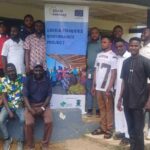On May 1, 2024, the EU Delegation to Liberia, led by Ambassador Nona Deprez and joined by ambassadors from Germany, France, Sweden, and Ireland paid a working visit to two cooperative enterprises in Maryland county. These enterprises are beneficiaries of the EU-funded Cassava Transformation Project (CASTRAP).

The Welin-Airnee Cassava Farmers’ Cooperative Society, situated in the remote community of Cavalla Kunokudi in the Pleebo-Sodoken district, and the Middletown Multipurpose Cooperative in the Middletown community of Harper district were the focal points of this visit. Both cooperatives, licensed by Liberia’s Cooperative Development Agency, boast a membership of 107, including 84 women and 16 young people. They engage in cassava production and processing of achieke and gari, with a significant portion of their processed cassava sold to their French neighbors due to their proximity to Ivory Coast.


The first point of call for the Delegation was Welin-Airnee where the visiting team having walked 3 km from the closest motorable community was received with fanfare by the leadership and members of the cooperative. The community leaders expressed profound gratitude to the EU for its support through CASTRAP, which has enabled the cooperative to establish an integrated cassava production, processing, and marketing enterprise since 2021. This has empowered them to process gari, super gari, and achieke for sale to assist its 107 members including 84 women and 16 youths. Additionally, they are also able to manage a functional savings and loans association to meet its members financial needs. Despite demand for their products in Pleebo city which is only 15km away, poor road network makes cross-border trade with Ivory Coast more viable. The community appealed to the delegation to advocate for road construction to enhance their business.


In Middletown, the community gave the delegation an even grander welcome. The Middletown Multipurpose Cooperative Society expressed particular gratitude for the CASTRAP project, which has allowed them to establish a cooperatively managed enterprise in their predominantly fishing community. The community, which now processes gari and super gari, is piloting the use of coconut waste and cassava starch to produce charcoal briquettes as an alternative cooking fuel. They plan to commercialize these briquettes, leveraging their proximity to the cities of Harper and Pleebo in Maryland and Tabou and San Pedro across the border in Ivory Coast. The EU Delegation admonished the group to continually enhance its capacity to sustain its enterprise beyond the project’s lifespan.






